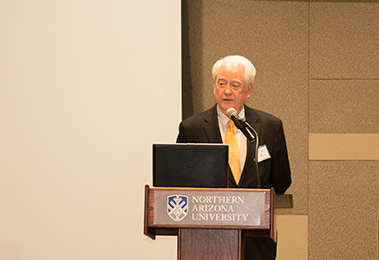Discussions of economic outlook constitute slippery ground but Bill Franke stands firmly on the foundation of discipline, focus and commitment to a business plan.
Northern Arizona University marked 40 years of presenting its economic outlook conference Thursday with the prominent and to-the-point Franke as the keynote speaker.
“We invest all over the world but it’s still about basic business principles,” said Franke, the managing partner of Indigo Partners LLC—a private equity fund focused on air transportation investments—and namesake of the W. A. Franke College of Business. He addressed a capacity crowd at the conference, presented by the college’s Alliance Bank Business Outreach Center.
Franke’s self-described “anecdotal walk-around” of international investment perspectives brought a strong message right to the doorstep of his northern Arizona audience: “There’s still huge opportunity out there if you are thoughtful, engaged and do your homework.”
“I’m not a trained economist but I am a pragmatist,” Franke said, shining a clear light of confident appraisal on the competing views of colleagues that ranged along a scale of dark pessimism to faint optimism.
Presenters Ron Gunderson and Dennis Foster, both from NAU, and Elliott Pollack—all of whom have been a mainstay of the annual conference for years—collectively mustered a middling enthusiasm for more of the same slow growth that has characterized the nation’s current long recovery from recession. While Gunderson noted an increase in Flagstaff-area home sales and median prices, Pollack pointed out that decreased employment opportunities are hampering overall expansion in the state.
During the equity investment travelogue, Franke offered his take on economic conditions in China, India, Europe, Brazil and other markets, distilling each segment into insightful quips, from the “best baseline value” to be found in central and eastern Europe to the need to be “a brave investor” in Brazil.
In a post-conference interview, Franke emphasized his candid, world-wise approach while discussing the realities of developments in China and the reluctance of Americans, at times, to see beyond their borders.
“We’re a country that’s grown up within itself, so we tend to think of the United States as know-all be-all, and in fact we’re kind of proud of that,” Franke said. “But the fact of the matter is, the U.S. economy is going to be smaller than the Chinese economy in the next five years. You can either deny it or you can figure out what to do about it, and I’m from the figure out what to do about it school.”
Earlier, during the public presentation, Franke acknowledged that his role as a “Mr. Fixit” in the business world stems from calmly finding order in the often-emotional melee of a foundering company.
“I love adversity as an investment thesis,” Franke said, noting that his firm “views adversity as an opportunity because very few others are looking at it that way.”
Taking a similar approach to Arizona’s education system, Franke responded during a Q&A session that the state has missed some business expansion opportunities because its commitment to education has “fared poorly as graded by outsiders. That’s something we all have an obligation to fix.”
In 2007, Franke took a monumental step toward doing something about it at NAU. His $25 million gift resulted in far more than a college of business bearing his name: His influence prompted the development of a systematic approach to broadening the global horizons of students—an attribute he said is sorely missing in many young graduates.
In addition, NAU interns at his investment firm are steeped in global awareness and communication skills, often with the result of transforming those students into candidates for top-level graduate schools.
NAU President Rita Cheng closed a retrospective speech on NAU’s growth and changes during the 40 years of the conference by honoring Franke’s legacy.
“We remain grateful for Bill Franke’s willingness to lend his name and considerable resources to a college that stands for some of the values I personally hold dear: hard work, persistence and the power of education to open a pathway to success.”



